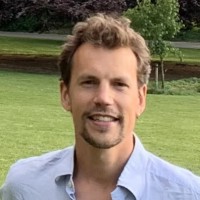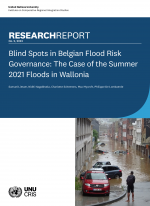Lietaer, Samuel

Adaptation to climate change
(Environmentally induced) human mobilities and migration
Low-income countries and European Union sustainable development policies
PhD in Environmental Studies, Université Libre de Bruxelles (ULB)
International and European Law (LLM), Vrije Universiteit Brussel (VUB)
Master’s in laws, Vrije Universiteit Brussel (VUB)
Master’s in political science, Vrije Universiteit Brussel (VUB)
Samuel Lietaer was a Visiting Research Fellow at UNU-CRIS, where he worked for the Climate Resilience Initiative project. As part of the team of international researchers from UNU-CRIS, UNU-MERIT and UNU-EHS, he collected data and analysed the responses to the 2021 floods at various levels of governance systems in Belgium (response strategy, anticipation/forecast measures, information sharing mechanisms); he evaluated the level of competence, connection, collaboration, and exchange in the context of flood risk governance from supranational to local levels; he synthesized the challenges and opportunities for regional integration and cross-border collaboration between Belgian, Dutch and German actors in building effective disaster management; he also examined the feasibility for vertical and horizontal integration for climate (flood) resilience based on multi-level governance frameworks. Finally, Samuel helped to prepare and to coordinate events by the UNU-Climate Resilience Initiative.
Samuel is an environmental social scientist working on both the policies and the subjective dimensions of human interactions with environmental change, with a focus on marginal regions of low-income countries. His main research interests relate to climate change adaptation issues, human mobilities related to environmental and climate change and (sustainable) development policies in low-income settings.
Previously, Samuel obtained his Master’s in both Political Science and Law at the VUB, whilst specialising in Environmental and Migration studies. He started working as climate policy officer at 11.11.11, the overarching Flemish development NGO in Belgium. After this policy experience, he returned to academics at the SOcio-eNvironmental dYnAmics Research Group (SONYA) of the Université Libre de Bruxelles (ULB). He supports students in Environmental studies, as well as PhD students in DR Congo through doctoral seminars organised by the ULB with the University of Kananga (Kassaï province).
He completed his PhD in the framework of the MIGRADAPT-project (2017-2021) which looked at how and under which conditions migrants’ remittances from Belgium serve for adaptation to environmental change in communities of origin. His doctoral thesis assessed migrants’ translocal practices and investigated translocal mechanisms of (political) remittances contributing to socio-environmental adaptation strategies in northern Senegalese home communities.
Before his PhD, Samuel also conducted research for the Belgian Development Cooperation in the field of climate-compatible private-sector development using perception approaches. Within this KLIMOS-programme he worked on two major topics. First, he looked at international private climate finance pathways by assessing the major Belgian actor’s perceptions in this regard. Second, he investigated the barriers and opportunities for the development of the clean cooking sector in Uganda by assessing the major stakeholders’ and private actors’ perceptions.

